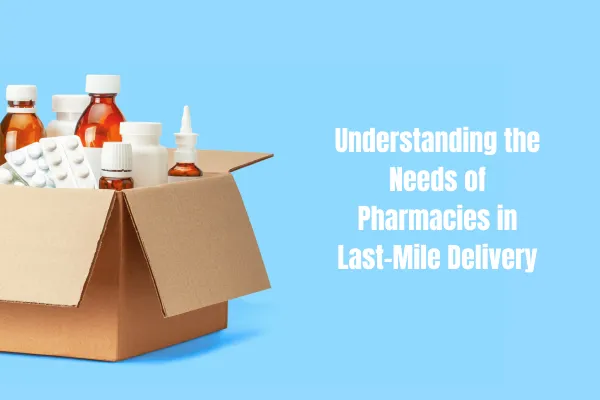
Understanding the Needs of Pharmacies in Last-Mile Delivery
Pharmacies play a critical role in the healthcare ecosystem, acting as the final touchpoint where patients receive life-saving medications. As consumer expectations shift toward faster, more convenient service, effective last-mile delivery has become essential for pharmacy operations. Yet, delivering pharmaceuticals isn’t like shipping ordinary parcels—it demands strict adherence to regulatory standards, temperature controls, secure handling, and clear communication.
This post explores the unique needs of pharmacies in last-mile delivery, the challenges they face, and best practices for meeting those needs. We’ll also highlight how Express Courier Services partners with pharmacies to deliver speed, security, and compliance.
1. Time Sensitivity and Patient Outcomes
Why Speed Matters
Patients rely on medications—especially critical treatments like insulin, antibiotics, and oncology drugs—to manage their health. Delayed delivery risks non-adherence, worsened outcomes, and even hospitalization. A recent survey shows that 78% of patients expect next-day delivery for prescription refills .
Best Practice
Guaranteed Delivery Windows: Offer clear cut-offs (e.g., orders by 2 PM for next-day delivery).
Same-Day Options for Urgent Needs: Provide rush service for life-critical prescriptions.
2. Temperature Control and Cold Chain Integrity
Maintaining Drug Efficacy
Many pharmaceuticals—vaccines, biologics, and certain injectables—require storage between 2 °C and 8 °C. Exposure outside this range can degrade potency. The FDA’s guidance on cold chain management outlines strict monitoring and documentation requirements .
Best Practice
Refrigerated Vehicles & Insulation: Use vans with built-in refrigeration and insulated packaging.
IoT Temperature Sensors: Real-time monitoring with automated alerts for excursions.
3. Regulatory Compliance and Security
Protecting Patient Data
Prescription orders contain protected health information covered by HIPAA. Courier partners must handle data securely, following guidelines from the HHS HIPAA Privacy Rule .
Safeguarding Controlled Substances
Delivering controlled drugs involves adherence to DEA regulations, including chain-of-custody logs and tamper-evident seals (see DEA Diversion Control) .
Best Practice
Encrypted Communications: Use secure APIs and messaging for order details.
Background-Checked Couriers: Ensure all handlers are vetted and trained in HIPAA/DEA protocols.
Chain-of-Custody Documentation: Maintain digital logs of every hand-off.
4. Flexible Delivery & Patient Convenience
Meeting Patient Schedules
Patients may not be available at standard business hours. Offering evening or weekend delivery can improve adherence and satisfaction.
Best Practice
Delivery Time Slots: Allow customers to choose 1–2 hour windows.
Notification & Rescheduling: Automated SMS or email updates with easy reschedule links.
5. Real-Time Tracking and Transparency
Building Trust
Patients and pharmacists need visibility into each shipment. Real-time tracking reduces anxiety and support calls.
Best Practice
GPS Tracking: Share live maps showing driver location.
Delivery Confirmation: Collect e-signatures or photo proof at drop-off.
Automated Alerts: Notify stakeholders at key milestones: pickup, in transit, and delivered.
6. Optimized Routing & Cost Efficiency
Balancing Speed and Cost
Complex urban layouts and peak-hour congestion can inflate last-mile costs. Smart routing saves fuel and time without sacrificing speed.
Best Practice
Dynamic Route Optimization: Use AI-driven tools that ingest live traffic data from Google Maps and Waze.
Micro-Hub Networks: Stage inventory in neighborhood-level hubs to shorten delivery distances.
7. Seamless Integration with Pharmacy Systems
Streamlining Operations
Manual order entry slows processing and introduces errors. Integration with pharmacy management systems ensures accuracy and efficiency.
Best Practice
API Connectivity: Automate order transmission, label printing, and status updates directly from pharmacy software.
Unified Dashboards: Provide pharmacists with a single view of all in-flight deliveries and exceptions.
8. Case Study: Improving Delivery for a Regional Pharmacy Chain
A West Coast pharmacy group partnered with Express Courier Services to overhaul its last-mile operations. By implementing micro-hubs in each major ZIP code and equipping vehicles with real-time temperature monitoring, they achieved:
30% Reduction in Delivery Times
Zero Temperature Excursions over six months
40% Fewer Customer Service Calls due to live-tracking visibility
This transformation boosted patient satisfaction and reduced operational costs.
9. How Express Courier Services Delivers for Pharmacies
At Express Courier Services, we specialize in the nuances of pharmacy logistics:
Rapid Dispatch: Same-day and next-day delivery windows with guaranteed cut-offs.
Cold Chain Expertise: Refrigerated fleet, insulated packaging, and IoT sensors.
Compliance Assurance: HIPAA-aligned data handling, DEA-compliant chain of custody, and background-checked couriers.
Technology-Forward: Real-time GPS tracking, API integrations, and automated notifications.
Local Knowledge: Micro-hubs strategically located to navigate urban traffic and reach patients quickly.
10. Future Trends in Pharmacy Last-Mile Delivery
Autonomous Vehicles & Drones: Pilot programs for contactless, on-demand delivery in urban centers.
Predictive Analytics: Machine learning to forecast demand, optimize inventory placement, and pre-position drivers.
Enhanced Telepharmacy Integration: Live video consultations upon delivery for patient counseling on complex therapies.
Conclusion
Last-mile delivery for pharmacies is more than moving packages—it’s delivering health, trust, and compliance. By understanding the unique needs of pharmacies—time sensitivity, temperature control, regulatory compliance, patient convenience, and technology integration—businesses can design last-mile solutions that enhance patient outcomes while controlling costs.
Ready to optimize your pharmacy’s last-mile delivery? Contact Express Courier Services today to learn how our tailored logistics solutions can meet your patients’ needs and support your pharmacy’s growth.